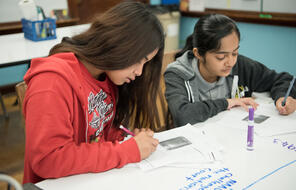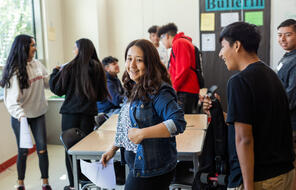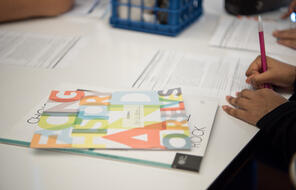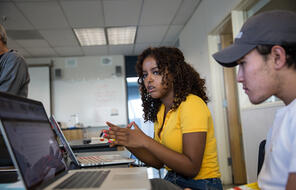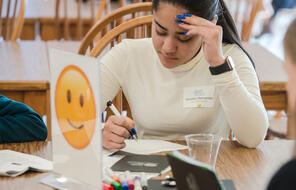Introducing Agency
At a Glance
Subject
- English & Language Arts
- Culture & Identity
Teaching Note: What appears below is a preview of this reading. Please download the PDF or Google Doc to get the full reading, which includes additional elements specifically designed for student use.
Adolescence is a time of growth and opportunity—a time when young adults transition from childhood dependence to adult independence. From around age ten until their early 20s, they are building the skills to make their own decisions, developing new interests, and setting goals for their future. This is an important time for young people to learn about the concept of agency and the role it has in their decision-making process.
Defining Agency
When we say that an individual or group has agency, we mean that they have the power and ability to make decisions and take action on their own behalf. They feel like they can make a difference in their lives and in the lives of other people. Paul Napper and Anthony Rao, psychologists and the authors of the book The Power of Agency, explain agency as “the ability to cut through all of what pulls at us, find emotional and physical balance, think more clearly, and advocate for ourselves so we can take a course of action that makes sense. With agency, we can feel more in command of our lives.” 1
Turn & Talk: Looks Like, Sounds Like, Feels Like
What does it look like, sound like, and feel like when you have agency?
Understanding Individual and Collective Agency
Individual agency is when a person takes action alone on their own behalf or on behalf of someone else. Collective agency is when a group of people work toward a goal together. Sociologist Nicki Lisa Cole explains the impact that individual and collective agency can have on individuals, social structures (family, religion, social class, and community, for example), and societal norms (such as eye contact, personal space, dress codes, and deadlines):
Agency is the power people have to think for themselves and act in ways that shape their experiences and life trajectories. . . . Individual and collective agency may serve to reaffirm social order by reproducing norms and existing social relationships, or it may serve to challenge and remake social order by going against the status quo to create new norms and relationships. Individually, this might look like rejecting the gendered norms of dress. Collectively, the ongoing civil rights battle to expand the definition of marriage to same-sex couples shows agency expressed through political and legal channels. 2
Let’s look at a few more examples. A young girl with individual agency asks her parent to buy her a blue shirt with a cartoon robot on it instead of a pink shirt with a cartoon princess. This young girl demonstrates agency when she rejects society’s gendered norms of dress.
A student with individual agency requests a meeting with a school administrator to advocate for themself after their teacher denies them the extra time they are allowed for a test because of their learning difference.
In 2015, the Supreme Court ruled that states cannot keep same-sex couples from marrying and all 50 states must recognize same-sex unions. Over decades, the collective agency of individuals, activists, politicians, and the US legal system helped to expand the definition of marriage to include same-sex couples.
In 2012, a group of employees from different fast-food franchises in Kansas City, Missouri, demonstrated their collective agency when they came together to organize fast-food workers across the city to fight for benefits like paid time off, sick days, and a $15 minimum wage. 3
Turn & Talk: Text-to-World
What is one other example of individual agency?
What is one other example of collective agency?
Understanding the Factors that Influence Agency
There are many factors that can influence someone’s agency at any given moment. For example, an individual’s agency in a particular situation might be impacted by aspects of their identity, such as age, race, gender, religion, language, and social class. Another example is how many people have reported feeling out of control, overwhelmed, and stressed during the COVID-19 pandemic. For young people, important factors that can influence agency also include self-esteem, hope and belief in their abilities, feeling like they matter, a sense of connectedness to others (at home, in school, online, and in their community), and feeling like they have power over their bodies. 4
We can also cultivate our own sense of agency. In their book The Power of Agency, Napper and Rao outline steps that individuals can take to feel more in control of their lives. Some of these steps include limiting distractions, such as phones, when we need to focus; getting enough sleep, nutrition, and exercise; surrounding ourselves with people who encourage and support us to work toward our goals; being open to learning new things; and taking time to reflect on big decisions, ask questions, and make a plan. 5
Turn & Talk: Most Influential Factors
What ONE factor do you think is most influential for young people? What makes you say that?
What is ONE step that you think you could take to cultivate your own sense of agency, especially in times when you don’t feel like you have any?
Closing
Despite how it may feel at times, especially when we are growing up, we are actors with agency in our own lives and communities. When we understand the factors that play a role in increasing or limiting our agency, we can start to develop the skills and tools necessary to make decisions, take action, and have control over things in our lives that matter to us.
- 1Anthony Rao and Paul Napper, “Seven Ways to Feel More in Control of Your Life,” Greater Good Magazine, April 15, 2019.
- 2Nicki Lisa Cole, “How Sociologists Define Human Agency,” ThoughtCo, January 22, 2019.
- 3Heather McGhee, The Sum of Us (New York: One World, 2021), 130–32.
- 4A. Vidyarthi et al., “Agency and resilience – foundational elements of adolescent well-being,” Adolescents 2030, March 19, 2021, 2.
- 5Anthony Rao and Paul Napper, “Seven Ways to Feel More in Control of Your Life,” Greater Good Magazine, April 15, 2019.

